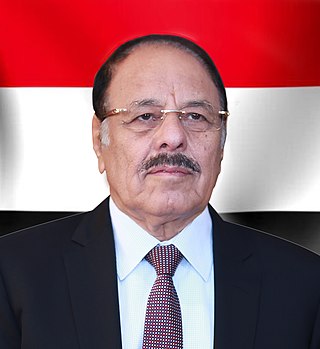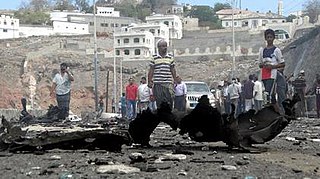Related Research Articles

Al-Qaeda is a Sunni pan-Islamist militant organization led by Salafi jihadists who self-identify as a vanguard spearheading a global Islamist revolution to unite the Muslim world under a supra-national Islamic state known as the Caliphate. Its members are mostly composed of Arabs, but also include other peoples. Al-Qaeda has mounted attacks on civilian and military targets in various countries, including the 1998 United States embassy bombings and the September 11 attacks; it has been designated as a terrorist group by the United Nations Security Council, the North Atlantic Treaty Organization (NATO), the European Union, and various countries around the world.

Abdulrab Rasul Sayyaf is an exiled Afghan politician and former mujahideen commander. He took part in the war against the Marxist–Leninist People's Democratic Party of Afghanistan (PDPA) government in the 1980s, leading the Afghan mujahideen faction Ittehad-al-Islami.
On September 11, 2001, 19 al-Qaeda terrorists took control of four commercial aircraft and used them as suicide weapons in a series of four coordinated acts of terrorism to strike the World Trade Center in New York City, The Pentagon in Arlington County, Virginia, and an additional target in Washington, D.C. Two aircraft hit the World Trade Center while the third hit the Pentagon. A fourth plane did not arrive at its target, but crashed into a field in Pennsylvania after a passenger revolt. The intended target is believed to have been the United States Capitol. As a result, 2,977 victims were killed, making it the deadliest foreign attack on U.S. soil, exceeding Japan's surprise attack on Pearl Harbor in Honolulu, Hawaii, on December 7, 1941, which killed 2,335 members of the United States Armed Forces and 68 civilians. The effort was carefully planned by al-Qaeda, which sent 19 terrorists to take over Boeing 757 and Boeing 767 aircraft, operated by American Airlines and United Airlines.

Sheikh Mohamed bin Zayed Al Nahyan, popularly known by his initials as MBZ, is an Emirati royal and politician who currently serves as the third president of the United Arab Emirates and the ruler of Abu Dhabi.
Abu Ubaidah al-Banshiri was the nom de guerre of Ali Amin al-Rashidi, was a founding member of al-Qaeda and served as the groups first military commander. He was known within the group as the "most capable and popular leaders"

The United Arab Emirates has quite a close and friendly relationship with the US, being described as the United States' best counter-terrorism ally in the Gulf by Richard A. Clarke, the U.S. national security advisor and counter-terrorism expert. In terms of defense, the United Arab Emirates Armed Forces has been nicknamed "Little Sparta" by United States Armed Forces generals and former U.S. Secretary of Defense James Mattis for its active role against extremists in the Middle East. The United Arab Emirates also hosts the only United States border preclearance in the Middle East.

Muhammad bin Nayef Al Saud, colloquially known by his initials MBN or MbN, is a former Saudi Arabian politician and businessman who served as the crown prince and first deputy prime minister of Saudi Arabia from 2015 to 2017 and as the minister of interior from 2012 to 2017.
Qatar News Agency is a state-run Qatari news agency.

Ali Mohsen Saleh al-Ahmar, sometimes spelled "Muhsin", is a Yemeni military officer who served as the vice president of Yemen from 2016 to 2022, when he was dismissed by President Abdrabbuh Mansur Hadi, who transferred the powers of the president and vice president to the Presidential Leadership Council. He is a general in the Yemeni Army and was the commander of the northwestern military district and the 1st Armoured Division. He played a leading role in the creation of the General People's Congress.

General Raheel SharifNI(M) HI(M) LOM is a retired four-star army general of the Pakistan Army who served as the ninth chief of army staff from 29 November 2013 to 29 November 2016. After his retirement as Pakistan's army chief, he was appointed as the commander-in-chief of the Islamic Military Counter Terrorism Coalition, a 41-nation alliance of Muslim countries headquartered in Riyadh, Saudi Arabia.

On 26 March 2015, Saudi Arabia, leading a coalition of nine countries from West Asia and North Africa, launched an intervention in Yemen following a request from Yemeni president Abdrabbuh Mansur Hadi for military support after his forces were ousted from Sanaʽa by Houthi insurgents during the Yemeni Civil War. The conflict ignited between the government forces, the Houthi rebels and other armed groups after the draft constitution and power-sharing arrangements collapsed, despite progress in the political transition led by the United Nations at that time, leading to an escalation of violence in mid-2014. The Houthis and allied insurgents seized control of Sana’a and other parts of the country in September 2014 and in the following months. This prompted President Hadi to ask Saudi Arabia to intervene against the Iranian-backed Houthis.
Qatar has been accused of allowing terror financiers to operate within its borders, which has been one of the justifications for the Qatar diplomatic crisis that started in 2017 and ended in 2021. In 2014, David S. Cohen, then United States Under Secretary of the Treasury for Terrorism and Financial Intelligence, accused Qatari authorities of allowing financiers who were on international blacklists to live freely in the country: "There are U.S.- and UN-designated terrorist financiers in Qatar that have not been acted against under Qatari law." Accusations come from a wide variety of sources including intelligence reports, government officials, and journalists.

The Islamic Military Counter Terrorism Coalition (IMCTC) is an intergovernmental counter-terrorist military alliance between 41 member states in the Muslim world, united around the war against the Islamic State and other counter-terrorist activities. Its creation was first announced by Saudi Arabian defence minister Mohammad bin Salman Al Saud, on 15 December 2015. The alliance was to have a joint operations center in Riyadh, Saudi Arabia.

The Aden unrest refers to initially ongoing conflict between Islamist factions, such as al-Qaeda in the Arabian Peninsula, and Islamic State of Iraq and the Levant's Yemen Branch, against the loyalists of president Abd Rabbuh Mansur Hadi and later to conflict between UAE-backed and Saudi-backed factions within the coalition. In 2017, fighting also broke out between factions aligned with different members of the Saudi-led coalition namely Saudi Arabia-backed Abdrabbuh Mansur Hadi and Al-Islah and UAE-backed separatist Southern Transitional Council and Southern Movement.

The Qatar–Saudi Arabia diplomatic conflict refers to the ongoing struggle for regional influence between Qatar and the Kingdom of Saudi Arabia (KSA), both of which are members of the Gulf Cooperation Council (GCC). It is sometimes called the New Arab Cold War. Bilateral relations are especially strained since the beginning of the Arab Spring, that left a power vacuum both states sought to fill, with Qatar being supportive of the revolutionary wave and Saudi Arabia opposing it. Both states are allies of the United States, and have avoided direct conflict with one another.
Fahd bin Turki Al Saud is a Saudi Arabian prince and military officer who served as the commander of the Saudi-led coalition joint forces operating in Yemen. He was relieved from his position and forced into retirement upon a royal decree issued on 31 August 2020. In June 2021, he was said to have been sentenced to death over an alleged coup attempt.

Events of 2020 in Yemen.

The Al Jawf offensive was a Houthi offensive that began in February 2020 with clashes in the Al Jawf Governorate during the Second Yemeni Civil War. Houthi forces were able to decisively capture the town of Al Hazm on 1 March 2020 from the Hadi government. On 27 April, the first phase of the offensive ended with the Houthis capturing 3,500 square kilometers of territory in Al Jawf Governorate. After reinforcing, the Houthis launched the second phase of their offensive on 27 May, making further advances toward the city of Marib and capturing the Maas military base on 20 November, 2020. The Houthis halted the offensive on 5 February 2021, in order to account for changes in the Saudi-led coalition and Southern Transitional Council. After reinforcing once more, the Houthis launched a new offensive towards Marib city on 7 February.

The Battle of Marib is an ongoing battle that erupted since February 2021 following the advance of the Houthis towards the city of Marib, the capital of Marib Governorate in Yemen controlled by the Cabinet of Yemen.
Events in the year 2022 in Saudi Arabia.
References
- ↑ "Saudi- IMCTC Secretary General Receives Commander of Lebanes... | MENAFN.COM". menafn.com. Retrieved 2022-08-31.
- ↑ "Bahrain News Agency". www.bna.bh. Retrieved 2022-08-31.
- ↑ "IMCTC chief briefs Guinea-Bissau Ambassador on coalition's efforts in combating terrorism". Saudigazette. 2022-04-14. Retrieved 2022-08-31.
- ↑ "DiplomaticQuarter: Bangladesh envoy lauds Islamic Military Counter Terrorism Coalition's works". Arab News. 2020-12-23. Retrieved 2022-08-31.
- ↑ "Maj. Gen. Mohammed bin Saeed Al-Moghedi, secretary-general of the Islamic Military Counter Terrorism Coalition". Arab News. 2019-11-30. Retrieved 2022-09-03.